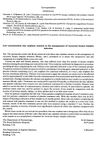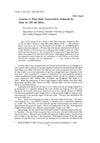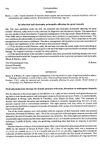 December 2015 in “Dermatologic Therapy”
December 2015 in “Dermatologic Therapy” Zinc sulfate solution is more effective than tea lotion for treating acne rosacea.
August 2015 in “대한피부미용학회지” Zinc sulfate may help hair growth.
[object Object]  60 citations,
October 2005 in “Experimental Dermatology”
60 citations,
October 2005 in “Experimental Dermatology” Zinc can both inhibit and stimulate mouse hair growth, and might help recover hair after chemotherapy.
 3 citations,
January 1985 in “British Journal of Dermatology”
3 citations,
January 1985 in “British Journal of Dermatology” Zinc sulphate solution was not effective in reducing the number, duration, or severity of recurrent herpes simplex infections.
 165 citations,
January 2014 in “Dermatology Research and Practice”
165 citations,
January 2014 in “Dermatology Research and Practice” Zinc is effective for treating various skin conditions, including warts and acne.
 12 citations,
July 1979 in “International Journal of Dermatology”
12 citations,
July 1979 in “International Journal of Dermatology” A patient with zinc depletion improved after zinc supplementation during parenteral nutrition.
 4 citations,
January 1992 in “The Tohoku Journal of Experimental Medicine”
4 citations,
January 1992 in “The Tohoku Journal of Experimental Medicine” Zinc made mice's coarse hair turn into fine hair without affecting skin structure.
 158 citations,
May 1968 in “The journal of nutrition/The Journal of nutrition”
158 citations,
May 1968 in “The journal of nutrition/The Journal of nutrition” Zinc is crucial for growth and health in rats.
 35 citations,
January 2006 in “Journal of Dermatological Treatment”
35 citations,
January 2006 in “Journal of Dermatological Treatment” Zinc can help with some skin problems, but its effectiveness varies depending on the condition.
 30 citations,
June 2006 in “British journal of dermatology/British journal of dermatology, Supplement”
30 citations,
June 2006 in “British journal of dermatology/British journal of dermatology, Supplement” Oral zinc sulphate reduces dark hair color in mice.
 27 citations,
May 2010 in “Dermatologic Clinics”
27 citations,
May 2010 in “Dermatologic Clinics” Zinc can be a helpful secondary treatment for certain skin conditions, but more research is needed to guide its use.
 14 citations,
August 2016 in “Journal of nanomedicine research”
14 citations,
August 2016 in “Journal of nanomedicine research” Zinc oxide nanoparticle biscuits improved growth and health in zinc-deficient rats without toxicity.
 3 citations,
November 2022 in “Frontiers in oncology”
3 citations,
November 2022 in “Frontiers in oncology” Low zinc levels may be linked to the return of gynecologic cancers.
 February 2021 in “Austin journal of nutrition & metabolism”
February 2021 in “Austin journal of nutrition & metabolism” Appropriate zinc levels may help prevent hair loss in university students.
 4 citations,
January 2023 in “Frontiers in Medicine”
4 citations,
January 2023 in “Frontiers in Medicine” Zinc is important for skin health, and supplements can help treat various skin and hair disorders, but more research is needed for conditions like psoriasis and vitiligo.
 4 citations,
December 2022 in “International Journal of Molecular Sciences”
4 citations,
December 2022 in “International Journal of Molecular Sciences” Zinc is crucial for skin health and treating various skin disorders.
 5 citations,
January 2019 in “Clinical Drug Investigation”
5 citations,
January 2019 in “Clinical Drug Investigation” Some off-label treatments increase hair density, but long-term safety unknown.
 1 citations,
March 2018 in “bioRxiv (Cold Spring Harbor Laboratory)”
1 citations,
March 2018 in “bioRxiv (Cold Spring Harbor Laboratory)” The hair treatment made hair grow faster and thicker and strengthened the hair roots.
 50 citations,
December 2020 in “Bioactive Materials”
50 citations,
December 2020 in “Bioactive Materials” Wound dressing absorbs fluid, regenerates hair follicles, and heals skin burns.
 101 citations,
January 1985 in “British Journal of Dermatology”
101 citations,
January 1985 in “British Journal of Dermatology” Spironolactone is effective for treating acne, hirsutism, and androgenic alopecia in women with few side effects.
[object Object]  11 citations,
January 1985 in “British Journal of Dermatology”
11 citations,
January 1985 in “British Journal of Dermatology” The document concludes that an inherited nail condition often improves on its own, and spironolactone effectively treats acne in women.
 85 citations,
December 1990 in “Journal of Investigative Dermatology”
85 citations,
December 1990 in “Journal of Investigative Dermatology” Minoxidil promotes hair growth in women with early-stage alopecia.
 10 citations,
June 2021 in “Primates”
10 citations,
June 2021 in “Primates” Wild geladas in crop areas show less grooming and aggression.
 5 citations,
January 2014 in “Current Dermatology Reports”
5 citations,
January 2014 in “Current Dermatology Reports” Many adult women suffer from persistent or late-onset acne, and while various treatments exist, finding the right one can be challenging.
 2 citations,
September 2022 in “Scholarly journal of otolaryngology”
2 citations,
September 2022 in “Scholarly journal of otolaryngology” Epipharyngeal Abrasive Therapy helps reduce symptoms in Long COVID patients with chronic epipharyngitis.
 April 2024 in “Advances in Redox Research”
April 2024 in “Advances in Redox Research” Human hair strength and health are linked to sulfur compounds that can be reduced by stress but improved with sulfur supplements.
26 citations,
February 1978 in “Journal of Pediatric Surgery” Long-term TPN in children can cause zinc deficiency, leading to health issues.
 21 citations,
January 2014 in “Dermatology Research and Practice”
21 citations,
January 2014 in “Dermatology Research and Practice” Hair and serum levels of zinc, copper, and iron are similar in people with alopecia areata and healthy individuals.
 February 2024 in “Medicina-lithuania”
February 2024 in “Medicina-lithuania” Obesity and bariatric surgery can cause hair thinning and temporary hair loss due to nutritional deficiencies and stress.
 4 citations,
July 1992 in “Clinics in Dermatology”
4 citations,
July 1992 in “Clinics in Dermatology” Skin surgery has significantly advanced since 1950, with improvements in chemical peels, hair restoration, lasers, and Mohs surgery, and the development of less invasive techniques and specialized training.




























